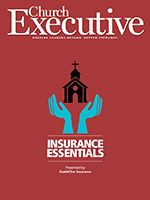
By Dave Sours
 Accidents happen. Catastrophes are unpredictable. There are many situations a church might encounter that will require submitting an insurance claim.
Accidents happen. Catastrophes are unpredictable. There are many situations a church might encounter that will require submitting an insurance claim.
To a church, the claims process can be overwhelming, as you might have little understanding of what happens behind
the scenes.
To offer insight and make the process easier for you and your insurance company, learn about who you’ll be working with, how you can be prepared after submitting a claim, and the settlement timeline.
It’s important to remember you’re not alone during this process, and you should have support to answer any questions and guide you along the way. In most cases, this will be an insurance adjuster. The adjuster represents the insurance company, and its role is to resolve the customer’s issue and serve as a channel between the customer and insurance company.
Additionally, the adjuster should offer you a better understanding of what to expect during the claims process. You should be informed of what’s required and how to make the course easier for both parties. Items of discussion might include your coverage and the deductible. It’s important to note the adjuster should be your main point of contact during the entire claims process.
What to have ready
 Because each insurance claim is unique, there isn’t one set list of information you should have prepared for your adjuster. Here are some tips on what to have prepared for common types of claims:
Because each insurance claim is unique, there isn’t one set list of information you should have prepared for your adjuster. Here are some tips on what to have prepared for common types of claims:
Theft: Date of loss; damages sustained; items missing; police report case number; and ownership documents.
Fire: Location of fire; damages sustained; Fire Department involved; and cause of the fire.
Lightning: Date and time of loss; direct strike damage, such as building, trees, etc.; items damaged; detailed evaluation forms from repair technicians noting the cause of damage; and estimated cost of repairs or replacement.
Roof Damage: Loss location; type of damage; indication of interior leaks; age and type of roof; cause of loss; indication of emergency repairs needed; estimate of repairs, if available; and indication of past repairs or claims.
Water Damage: Confirmation of water main turned off; indication of fresh water or sewage; approximate square footage of area affected; and source of the water.
Be prepared with as much detail as possible regarding your claim. The more information you have ready, the less your adjuster will be required to follow up — and the quicker the process will be completed.
The claims timeline

Again, because each claim is different, the timeline won’t be the same for every situation. However, customers can expect to be contacted by an adjuster within two business days after submitting a claim. From there, an adjuster might spend two to five days gathering information for an estimate. The industry average for a property claim to go through the entire process is 16 to 20 days.
The degree of the claim will determine the average time of completing the process. Claims — such as bodily injury, professional liability and specialty losses — will typically require more time and attention from the adjuster.
Making the process easier
Handling a loss at your church can be challenging. With the teamwork of the church, insurance company and insurance adjuster, returning to pre-loss operating conditions can be easier. When initially filing your claim, be sure to include all relevant contact information to ensure the adjuster can easily and quickly reach you. Also, identify your preferred method of how they can contact you. Be patient with the adjuster, but also prompt in offering information when it’s requested.
Gaining a better understanding of insurance claims and what it takes to resolve an issue can be helpful in getting your organization through a loss. Remember to be patient and work as a team with your adjuster, and the feelings of stress and worry will disappear.
Dave Sours is Vice President of Claims Operations at GuideOne Insurance in West Des Moines, IA, and has been with the company for more than 20 years. He is responsible for managing GuideOne’s claims division, including the company’s field operations.



. Very well explained! I have learned many great things from your articles. I have been checking out all of your blogs as well, thanks for sharing this.